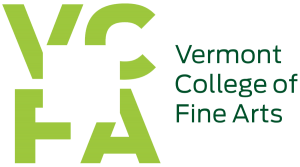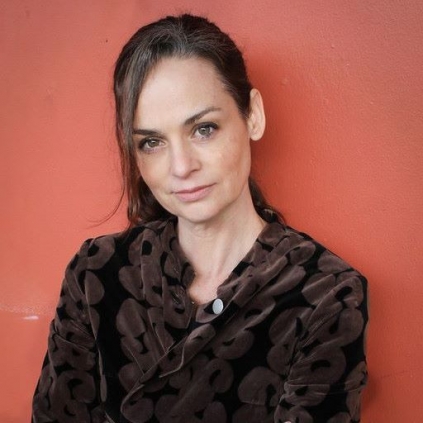Breaking Genre Borders with Julianna Baggot
Julianna Baggot is “intense.” The Faculty Director of VCFA’s MFA in Writing & Publishing, she proudly wears that badge, and brings that sort of energy to our Forms class. Sharp, funny, and never one to hold back, what she does best with the cadre of young writers assembled before her is to stress the importance of showing up: in writing, “no one cares if you don’t.” Sit down, write, go to bed, wake up, do it again. For Baggot, it’s worked—25 times over.
In this interview with MFA candidate Breanne Cunningham, Baggot touches on such concepts in writing as boundaries, compartmentalization, and the raison d’être of this teaching career: how can one teach writing in the first place?
This is just a condensed version; the full interview is on Hunger Mountain’s website.
Julianna Baggot, the new Faculty Chair for VCFA’s full-residency Writing and Publishing program found herself drawn to Montpelier’s College Hill because of what was already embedded in the program here: a cross-genre approach to learning—which mirrors her own teaching philosophy—alongside publishing curriculum that educates students on the business of writing. The infancy of the program however, meant she would have a hand in shaping its evolution.
And who better to mold an emerging writing program than an author of over twenty books whose work spans all genres and subgenres of literature? Stepping into the roll of Faculty Chair, she wishes to “translate her own writer-ly experience to emerging writers” by creating new ways of tapping into creativity and voice that are innovative and come from the artist’s own mind. To implement her methods, she uses a variety of techniques in the classroom, from word association and memory exercises, to watching scenes from a film for dialogue, or dissecting the opening sentence of an essay, Julianna inspires students by keeping material fresh, fun and challenging.
What vision do you have for the Writing & Publishing Program?
There’s a strange culture around the idea of teaching writing—Some people don’t believe it can be taught—
But you do?
Yeah! Aggressively! And I’m so thankful for the people that came before me who dedicated themselves to teaching, I think writing might be only the field—it’s existed in baseball—with this idea of raw talent. I believe there is such a thing as an ear for language and a natural eye, but I absolutely believe writing can be taught and I am fascinated with trying to create new ways to help young writers develop.
The idea is that each genre informs the other. Many programs cordon off different genres and have students define and limit themselves before that is appropriate. I started out in my MFA program as a fiction writer—I just wrote short stories. The end. But since then, I’ve written every other kind of writing and it might be foreign to a screenwriter and a poet that there is much they can learn from each other, but to me, the poem and the screenplay have so much in common, so much shared territory.
Like what?
First of all, they are the most similar on the page; they have the most white space around them, so they have to hold up and endure. The poet has to support the work through image and narrative, and the screenplay has to support through image, dialogue and plot. It’s very clear to me, having written both, that the screenplay can be seen as a plot poem. It’s very clear that poetry has a lot to teach the fiction writer about epiphany, that the fiction writer has a lot to teach the essayist about storytelling, and that the essayist has a lot to teach everybody about writing from the truth.
You’ve mentioned in class that you compartmentalize and when you’re focused on someone or something, everything else falls away. It reminded me of Tuesdays with Morrie.
I think it’s honestly a genetic disorder. [laughs] My father has it… There is a hyper-focus that goes on… It goes on when I’m writing, too. I’m so human-centric; my writing is such about human beings that I have to remind myself there is setting (laughing). When I’m with whomever I’m with, I absolutely focus on that person and that moment. It’s sometimes why I think I don’t understand Buddhism. I’m like, really, the present moment all the time? [laughs] I’d like to have some awareness of the rest of the world! But it all falls away when I’m with somebody.
Can you talk about the boundary between being a writer and being a teacher when you find yourself in the position of learning as opposed to teaching? How does that inform your writing?
Sometimes it’s the simplest thing I’m saying. I hear a little echo in my head as I’m saying it to the class oh, that’s what I’m not doing right now in my piece. So sometimes it is going back through and trying to figure out what they’re doing and really I’m still processing my own work in the background and realizing what’s not there. Sometimes what I am teaching is the thing I need to hear as a writer.
It’s like an epiphany. It’s amazing how teaching is reciprocal in that way. What long-term habits or lessons you hope to impart on students?
I want them to create a sustainable practice. The workshop is great and it helps you to have deadlines and it helps you to have support, but I want students to have a daily practice or as close to a daily practice that they can. A lot of the things I talk about in workshop are not appropriate to them now in the program, but I do talk about creative process—I make time for it specifically—because I want some of the things I say to come back to them when they’re in the muddy pit of a project not knowing what to do. I want them to remember that rope I gave them. Authentic Nike Sneakers | Entrainement Nike


